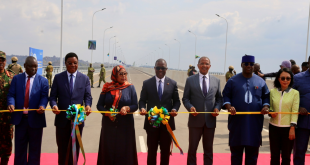Published: July 22,2024
By Gerald Mbanda

The third plenary session of the 20th Communist Party of China (CPC) Central Committee is presided over by the Political Bureau of the CPC Central Committee in Beijing, capital of China. The plenary session was held from July 15 to 18, 2024. [Photo/Xinhua]
The Third Plenary Session of the 20th CPC Central Committee which took place on Jul 15 –18, 2024, ended with one assuring resolution among others of deepening reforms as the driving force towards China modernization. At the session, the Central Committee gave a highly positive assessment of the success and achievements China has made in comprehensively deepening reform since the beginning of the new era. The reform tasks laid out will be completed in 2029, when China celebrates its 80th anniversary.
Since China embraced reform and opening up in 1978, the country has undergone miraculous economic development moving from a poor agrarian country to the second largest economy in only 46years. Economic figures in the 1960’s, reflect that several African countries were far richer than China. For example, Kenya and South Africa had a GDP of $97 and $433 respectively, while China had a mere $89. Today, China’ GDP stands at $ 8.65 trillion while Kenya and South Africa have $374billion and $113.4billion respectively. I have always taken keen interest to know what happened to the African countries and I believe that one of the key factors lies in governance, hard work and the discipline of proper utilization of public resources which is an important lesson that many African countries today can learn from China.
The strategies laid down during the third plenum of the 20th CPC Central Committee, will see China move towards national rejuvenation through Chinese modernization. “We must purposefully give more prominence to reform and further deepen reform comprehensively with a view to advancing Chinese modernization in order to better deal with the complex developments both at home and abroad, adapt to the new round of scientific and technological revolution and industrial transformation, and live up to the new expectations of our people,” reads part of the resolution of the third Plenary Session of the 20th CPC Central Committee.
When China proposed the Global Development Initiative (GDI) together with the Global Security Initiative (GSI) it is evidence that China wants to share its development dividends with the globallycommunity with no discrimination, while the GSI calls for adhering to the general principle of pursuing progress while ensuring shared development, securityand stability. China is the only country in the world that initiated advocacy on the concept of building a global community with a share future, while the western world has thrived on exploitation of other countries especially from the global South.
Additionally, the Global Civilization Initiative (GCI), advocates respect for the diversity of civilizations and the common values of humanity. Western countries treats global South countries with disrespect and superiority complex, assuming that their civilization is better than others and their pursuit of imposing their “values” on other civilizations. China’s global initiatives reflect her vision and foreign policy toward the world to achieve development, prosperity, security and stability in the entire world, and define the path that China has set to deal with others. China embraces mutual respect, and strives for an orderly multipolar world as opposed to the western hegemony.
The Belt and Road Initiative (BRI) is one of the global flagship development projects with 152 countries and 32 International Organizations that have signed cooperation documents with China. Since joining the BRI, many countries have benefited on several development projects that improved their economies and created jobs. African countries need more infrastructure development as an impetus to ensure sustainable economic growth through intra-African and international trade.
The African Development Bank (ADB) estimates that Africa’s infrastructure financing needs will be as much as $170 billion a year by 2025, with an estimated gap of around $100 billion dollars per year. Through BRI and the Forum for China and Africa Cooperation (FOCAC), African countries have been able to access financing from China for infrastructure development with no strings attached. Over the last 20 years, Chinais sub-Saharan Africa’s largest trading partner with a total trade volume reaching a record $282 billion in 2023.
Strengthening full and rigorous Party self-governanceby the CPC not only instills discipline among the leaders but also creates conducive environment for effective leadership to take on the country’s development to the next level. One of the leadership philosophies that makes China succeed where many have filed, stems from pursuing socialism with Chinese characteristics, where reforms and developmenttrajectory are tailored to the Chinese context, culture and needs of the people.
One of the things that make me admire China more is the ability to set goals and achieve them in the set timeframe. This shows that planning and policy implementation is done in the right manner. China realized the first centenary goal of building a moderately prosperous society in all respects in 2021, after lifting more than 800 million people out of poverty and eliminating abject poverty in less than 50 years. The resolutions of the third plenary session of the 20th CPC Central Committee have set a new pace for China to steadily progress towards achieving the second centenary goal of building China into a modernsocialist country by 2049 and also o share the development achievements with the rest of the world.
 Africa -China Review Africa -China Cooperation and Transformation
Africa -China Review Africa -China Cooperation and Transformation
